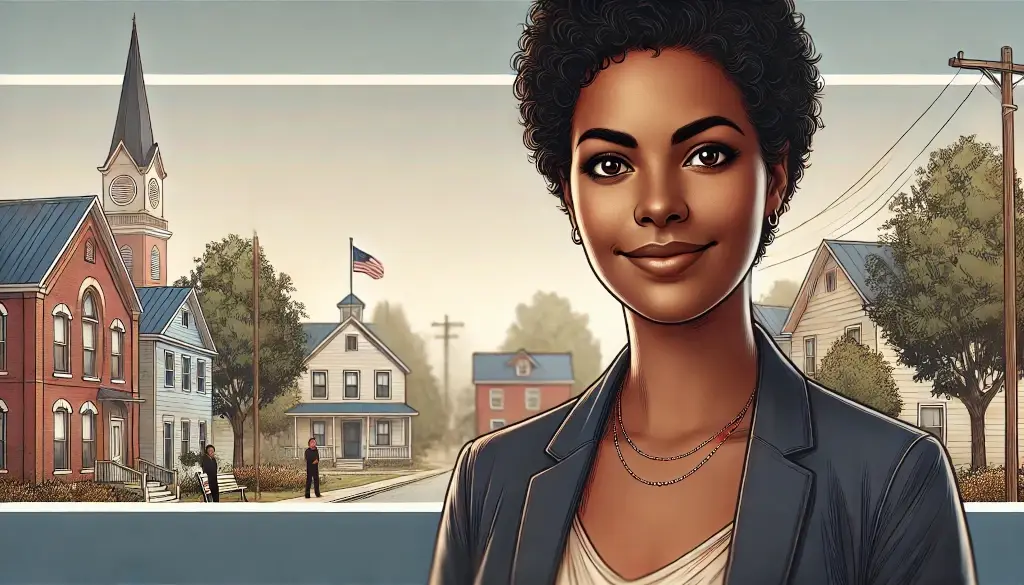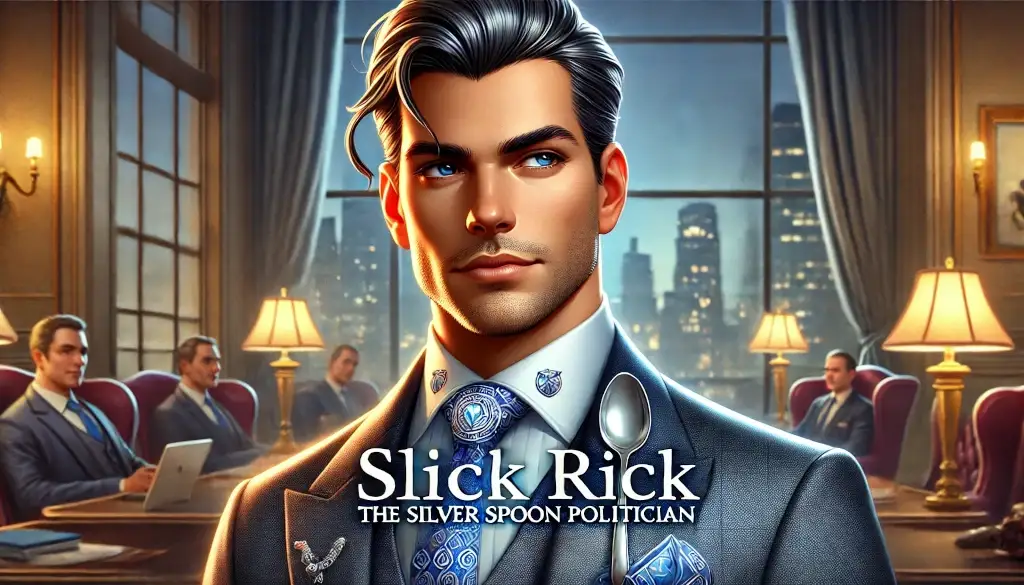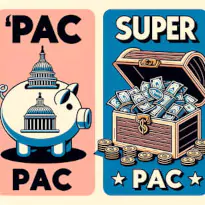The Story of Jane A Small-Town Councilwoman:
It’s a quiet evening in a small, low-income town. The streets are lined with modest homes, where families struggle to make ends meet. Jane, a local city councilwoman is running for a state seat. She’s spent years working to improve the lives of her neighbors—creating job programs, advocating for better education, and helping the community thrive despite economic hardships. But this race is different. Her opponent, Slick Rick, isn’t just well-funded—he’s backed by big PACs and Super PACs, with millions of dollars pouring into his campaign.
Table of Contents
- Jane: A Small-Town Problem Solver
- The Underdog’s Fight: Jane vs. Goliath
- Slick Rick: The Silver Spoon Politician
- Jane: Fighting for Her Low-Income Community
- What Are Campaign Contributions and Political Committees?
- The Power of Super PACs: Goliath’s Secret Weapon
- What is Dark Money?
- The Impact of PACs and Super PACs on Communities Like Jane’s
- Why We Should Care: It’s About More Than One Election
- Campaign Finance Reform: Leveling the Playing Field
- Conclusion: Public Service or Personal Enrichment?
- FAQ: PACs, Super PACs, and Dark Money
- Reference Materials:
While Jane knocks on doors and listens to the concerns of her constituents, Slick Rick’s face is everywhere: billboards, TV ads, and social media, thanks to his endless supply of campaign contributions. Unlike Jane, who’s fighting to lift her community out of poverty, Slick Rick votes against a living wage, cuts taxes for big businesses and serves only the wealthy. For Jane, this campaign isn’t just an election—it’s a battle for the soul of her community.
Jane: A Small-Town Problem Solver
Jane isn’t just any candidate—she’s a smart, educated woman who has spent years on the city council solving real problems for her community. Whether it’s fixing local roads, improving schools, or helping small businesses thrive, Jane has earned a reputation for getting things done. She understands the everyday struggles of her neighbors because she’s lived them too.

Despite her success in the community, Jane faces an uphill battle running for a state seat. While she has the trust and respect of her town, her opponent has a war chest of funds from wealthy donors and powerful Super PACs. For Jane, the race isn’t just about winning a seat—it’s about making sure the people’s voice, not big money, is what matters most in politics.
The Underdog’s Fight: Jane vs. Goliath
In a small town, Jane, a hardworking city councilwoman, decides to run for a state seat. But she faces an uphill battle against an incumbent politician with powerful allies—PACs, Super PACs, and wealthy donors who flood the race with cash. It’s a classic David vs. Goliath scenario, where Jane is the underdog with limited resources, while her opponent is backed by a fortune in campaign contributions.
As Jane knocks on doors, meeting voters face-to-face, her opponent’s ads plaster the district, thanks to his deep-pocketed supporters. Every billboard, radio station, and social media platform screams his name, making it hard for Jane to cut through the noise. Her story isn’t just about this one election; it’s about how money dominates politics and why everyday candidates struggle to have their voices heard.
Slick Rick: The Silver Spoon Politician
Jane’s opponent, Slick Rick, couldn’t be more different. Born into wealth, Rick is a trust-fund baby who inherited his political career from his father. For him, public service isn’t about helping people. It’s about keeping the family legacy alive and using his power for personal gain. Since taking office, Slick Rick hasn’t voted for a single bill that benefits working families. Instead, he’s backed by big corporations, fighting against raising the minimum wage and cutting taxes for the wealthy. For Rick, public service is just another way to get richer.

Slick Rick consistently supports policies that hurt regular people but help big businesses. Whether it’s tax cuts for the wealthy or blocking legislation that could improve healthcare and education. Ricks’ loyalty lies with the biggest donors, not the community. While Jane works hard to fix problems, Slick Rick is too busy doing the bidding of the state’s biggest companies. Ensuring his wealthy backers stay happy.
In this David vs. Goliath battle, Jane is the candidate who cares about real people, while Slick Rick is just in it to protect his fortune and the interests of his wealthy friends.
Jane: Fighting for Her Low-Income Community
Jane isn’t just any small-town councilwoman—she’s a champion for her low-income, minority community. Over the years, she’s worked tirelessly to improve education. While creating programs to help kids from struggling families stay in school and succeed. Jane has also spearheaded job training initiatives, helping minorities and the unemployed find work in a town where economic opportunities are scarce.
Families Struggling
Despite the lack of wealth in her community, Jane has made a real difference. Her focus is on real change for people who need it most—families struggling to make ends meet, kids who deserve a better shot at education, and individuals trying to find stable employment.
But now, as she runs for a state seat, she’s up against Slick Rick. A man who has never had to worry about finding a job or paying the bills. Slick Rick’s policies don’t help people like Jane’s neighbors. Ricks always voted to block minimum wage increases and cut taxes for the biggest corporations. Jane’s work is about lifting people up, while Slick Rick’s is about padding his own pockets and protecting the interests of his wealthy backers.
What Are Campaign Contributions and Political Committees?
Political campaigns are fueled by money. Campaign contributions are donations from individuals, corporations, unions, and groups meant to support a candidate or cause. These contributions are collected and distributed by political committees. Organized groups like PACs operate under strict limits on how much they can contribute directly to a candidate.
The Real Problem
The rise of Super PACs, which can raise and spend unlimited amounts of money. Often from wealthy donors, but they can’t directly coordinate with campaigns. This creates an uneven playing field for candidates like Jane.
PACs and Super PACs may claim they’re just supporting political ideas, but in reality, they often end up supporting candidates who will push for policies that benefit their donors. Jane’s opponent has no trouble raising money, thanks to these groups. But Jane? She has to rely on smaller, individual donations. It’s David vs. Goliath all over again.
The Power of Super PACs: Goliath’s Secret Weapon
Jane’s opponent doesn’t just have wealthy friends backing him. He has the advantage of Super PACs. These powerful groups can spend unlimited amounts on political ads. Making it nearly impossible for smaller, grassroots candidates like Jane to compete. Super PACs aren’t bound by the same restrictions as regular PACs; they can raise as much money as they want from corporations, unions, and even billionaires.
Think of it like this: Jane is trying to compete in a race, but her opponent has a car while she’s on foot. Every ad, flyer, and billboard Jane sees is another obstacle. Backed by wealthy donors who have a vested interest in keeping her opponent in power. Super PACs are legally barred from directly coordinating with campaigns, but their influence is unmistakable.
What is Dark Money?
Jane isn’t just up against visible opponents like PACs and Super PACs. There’s another player in the shadows. Dark money refers to funds donated by groups that don’t have to disclose their donors. These secretive groups pour millions into political ads and influence campaigns. Voters have no idea where the money comes from or whose interests it’s serving.
This means Jane could be facing attacks from mysterious sources, funded by billionaires or corporations or even foreign agents; and they certainly don’t want their names attached to political influence. Dark money makes it harder for candidates like Jane to fight back because she’s battling an invisible enemy. It’s another example of how big money warps politics.
The Impact of PACs and Super PACs on Communities Like Jane’s
For low-income communities like Jane’s, the influence of PACs and Super PACs is devastating. Wealthy donors and corporations fund candidates like Slick Rick to push policies that keep the rich richer while leaving Jane’s community to struggle. Dealing with underfunded schools, low wages, and job shortages. Jane, with her limited campaign budget, can’t compete with the flood of cash from political action groups that promote her opponent’s agenda. While consistently neglecting communities like hers.
Super PACs
Pour millions into slick ads that portray Slick Rick as the best choice. Painting Jane as inexperienced, despite her hands-on work in improving people’s lives. This is how cash in politics harms small, underprivileged communities. It buys power for those already at the top, making it harder for grassroots leaders like Jane to break through and make a difference for the people who need it most.
Why We Should Care: It’s About More Than One Election
This isn’t just about Jane vs. Slick Rick. It’s about how money in politics shapes the world we live in. When PACs and Super PACs dominate elections, they help candidates who serve corporate interests, like Slick Rick, stay in power. And while Slick Rick is busy cutting deals with lobbyists and voting for tax breaks for the rich, communities like Jane’s get left behind.
If we let the system continue to be run by big money, everyday Americans just like you—especially those in low-income areas—will always come last. Jane’s story shows why campaign finance reform is so crucial. Without it, politicians who serve the people, not the wealthy, will always face uphill battles against Goliaths like Slick Rick.
Campaign Finance Reform: Leveling the Playing Field
The solution to these problems? Campaign finance reform. This would involve changing the rules so that money doesn’t have as much influence in politics. Reform could mean limiting how much wealthy donors and Super PACs can spend or requiring all political donations to be transparent so that voters know exactly where the money is coming from.
Candidates like Jane stand a better chance when the system is fair. Right now, it’s like she’s playing a game where the rules are stacked against her. But if voters push for reform and support candidates who genuinely care about changing the system, there’s hope. The battle might be David vs. Goliath, but with the right tools, David can still win.
Conclusion: Public Service or Personal Enrichment?
In the end, this isn’t just about money. It’s about the kind of leaders we want. Jane is running because she wants to serve her community, to make sure that government works for everyone, not just the wealthy few. But her opponent? He’s been in office for years, enjoying the perks of power and the benefits of wealthy donors. His loyalty is to the people who fund his campaign, not to the voters.
This is the difference between public service and personal enrichment. Jane represents the type of candidate who wants to bring positive change for regular people, but if the system remains dominated by PACs, Super PACs, and dark money, only the rich and powerful will win. The real question is: who do we want in office? People who are there to serve themselves or those who truly want to serve the people? What happened to Jane you ask? She lost, but she’ll be back…
FAQ: PACs, Super PACs, and Dark Money
1. Why do PACs and Super PACs matter?
PACs and Super PACs matter because they play a huge role in how political campaigns are run. They allow people and businesses to pool money to support or oppose candidates. This can help candidates raise more money to reach voters, but it also means that wealthy donors can have more influence on elections than everyday people.
2. How does dark money affect elections?
Dark money affects elections by hiding the identity of the people or groups funding political ads. This makes it harder for voters to know who is influencing the election and what their interests are. Without transparency, it’s difficult to hold politicians accountable to their true supporters.
3. Can regular people donate to PACs?
Yes, regular people can donate to PACs, but they are limited to giving up to $5,000 per year. Super PACs, on the other hand, can accept unlimited donations from anyone, including corporations and unions. However, they can’t directly give that money to a candidate’s campaign.
4. How do Super PACs spend their money?
Super PACs spend money on independent expenditures, which means they pay for things like ads, mailers, and online campaigns that either support or oppose a candidate. They cannot work directly with the candidate’s campaign, but they can spend as much as they want on their own.
5. What is being done to stop dark money?
Some lawmakers and organizations are pushing for campaign finance reform to limit the influence of dark money in elections. They are working to pass laws that would require more transparency about who is donating to Super PACs and other political groups. However, these efforts face strong opposition from wealthy donors and powerful organizations that benefit from the current system.
Reference Materials:
PACs vs. Super PACs:
- PACs (Political Action Committees) can donate directly to candidates but have strict limits on how much they can contribute. Super PACs, created after the Citizens United ruling in 2010, can raise unlimited money from corporations, unions, and individuals, but they cannot donate directly to campaigns. Super PACs use these funds to influence elections through independent expenditures like ads.
Campaign Legal Center – PACs and Super PACs
Dark Money:
- Dark money refers to funds donated to political campaigns through organizations that don’t have to disclose their donors, such as 501(c)(4) and 501(c)(6) groups. These organizations can raise unlimited money and use it to support or oppose candidates indirectly, often through Super PACs. The lack of transparency makes it difficult for voters to know who is funding political messages. OpenSecrets – Dark Money

My developer is trying to convince me to move to .net from PHP. I have always disliked the idea because of the costs. But he’s tryiong none the less. I’ve been using Movable-type on a number of websites for about a year and am nervous about switching to another platform. I have heard good things about blogengine.net. Is there a way I can import all my wordpress content into it? Any help would be really appreciated!